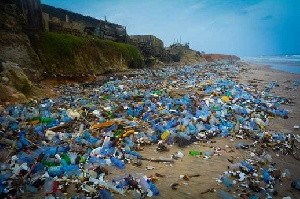 It is estimated that in Ghana, waste produced from plastic packaging amounts to 270 tonnes per day
It is estimated that in Ghana, waste produced from plastic packaging amounts to 270 tonnes per day
Efforts to recycle plastic waste in the country have received a major boost following the signing of a Memorandum of Understanding between eight leading manufacturers, to among other things promote investments and harmonize waste reprocessing.
Dubbed the ‘Ghana Recycling Initiative by Private Enterprises’ (GRIPE), the idea is led by Coca-Cola, Dow Chemicals, PZ Cussons, Voltic Ghana Limited, Unilever, Nestle Ghana, Guinness Ghana Breweries Limited and Fan Milk Limited, and is expected to help ensure that plastic waste is handled in a more sustainable way.
Its objectives include raising awareness and galvanizing efforts of member-companies in the fast-moving-goods group to spearhead initiatives for managing plastic waste in a more sustainable manner, toward making Ghana the neatest country in Africa by 2020.
“As individual companies, we all have our own environmental programmes that we run; however, we know that if we come together we will able manage the waste better.
So, we pooling our resources together. “Our main objectives are centred on research, public advocacy, multi-stakeholder engagement and second-life implementation – turning plastic waste into something valuable,” said Joyce Ahiadorme, a representative of Voltic Ghana and one of the lead coordinators for GRIPE.
Asked when the initiative will be implemented, Mrs. Ahiadorme said it will take off next month, with the piloting of second-life solution whereby plastic waste will be used with concrete for building purposes, especially public toilets.
To enable it achieve its objectives, GRIPE will also be working with existing waste management and recycling firms like ZoomLion, which it seeks to draw lessons from.
Ralph Ayitey, National Executive Committee member of the Association of Ghanaian Industries (AGI), was upbeat that GRIPE – together with the recently-launched National Sanitation campaign of government – will find sustainable ways to manage the several tonnes of plastic generated on a daily basis.
Currently, about 10 percent of plastic waste is recycled while the rest finds its way into water-bodies, thereby causing environmental and health challenges. GRIPE hopes to increase the percentage of recycled plastic to some large volumes by end of 2020.
Ghana is also now ranked the seventh most-dirty country in the world – and this has affected efforts aimed at making this country the preferred tourist destination of the sub-region.
“The debate over plastic waste management has persisted and taken centre-stage in AGI’s advocacy throughout the year.
With the increasing public concern over plastic waste accumulation, the pressure on policymakers to adopt oxo-degradable additives for flexible plastic has been mounting,” Mr. Ayitey added.
According to him, as much as government and the private sector continue to find a lasting solution to the challenges posed by plastic waste, there is equally need for a change in attitude by the citizenry toward plastic waste management in the long-run.
“Therefore, we must all embrace the education aspect, which may require a long haul. A lot depends on us,” Mr. Ayitey added
Although GRIPE has eight founding members, it says other businesses that operate along the manufacturing sector – especially those whose activities lead to the generation of plastic waste – are also welcome to the GRIPE platform.
“Putting up a recycling plant is a great investment, and none of the companies involved has the resources to do that; but what we are saying is that there are people interested in this space. They need activities like GRIPE in order to help them collect, segregate and educate people that there is wealth in waste,” Mrs. Ahiadorme explained.